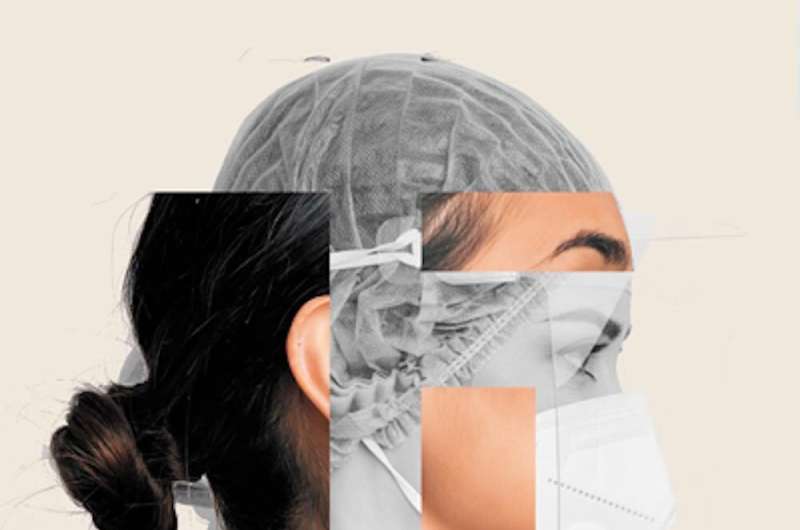This article has been reviewed according to Science X's editorial process and policies. Editors have highlighted the following attributes while ensuring the content's credibility:
fact-checked
trusted source
written by researcher(s)
proofread
Canada's health-care crisis is gendered: Researcher says the burden of care falls to women

As we enter cold, flu and COVID season, Canada is continuing to experience a health-care crisis. One in six Canadians don't have a family doctor and less than 50% are able to see a primary care provider on the same or next day. Both the B.C. Nurses Union and Hospital Employees Union report over one-third of their members are considering quitting, largely due to burnout.
Because women make up 75% of the health-care workforce—and are responsible for the majority of care work in the community and at home—women bear the brunt of this crisis, much as they did during the COVID-19 pandemic.
In 2020 and 2021, as co-lead of the Gender and COVID-19 Project based at Simon Fraser University, I spoke with nearly 200 women working on the frontlines of the COVID-19 response.
Their stories, compiled in my book Conscripted to Care, range from well-paid physicians to those making minimum wage cleaning rooms in long-term care (LTC) facilities, with participants identifying along a range of social positions related to factors including race, ethnicity and sexuality. Their combined experiences illustrate the cracks within our health system created by gender inequality.
Health care is built on women's labor
Not only is the health sector feminized, but women—particularly racialized women—are more likely to be in positions at the lower end of the pay scale, that also require close and prolonged contact with patients. When space, equipment and staff are scarce, these frontline workers are left to fill intractable gaps.
An LTC care aid described working under conditions so short staffed that some residents had missed several baths in a row:
"You feel bad because there are people, and this is their homes and their lives potentially, right. And they're not getting the care that they need and so how I mean it always ends up coming back on us is we have to eventually just have to stop and find the energy or find the time—it eventually just catches up to us. The work just doesn't disappear, we just don't do it for that day."
Such circumstances can lead to moral distress, the experience of being unable to provide ethically required care due to structural constraints. In a recent study we found 57% of LTC workers surveyed were considering leaving their profession due to moral distress.
The care economy depends on women's labor
The care economy is the paid and unpaid labor related to caregiving such as childcare, elder care and domestic chores.
Like health care, the care economy is primarily staffed by women. For example, in Canada, over 96% of early childhood educators (ECEs) are women.
Jobs in the care economy tend to be poorly paid and valued. ECEs felt this distinction during the pandemic, noting they were rarely mentioned in celebrations of essential workers:
"You know, they're clapping for the nurses, they're clapping for all the essential workers, but they never mention us. Like, we're taking care of your children and yet nobody's clapping for us."
The pandemic demonstrated how essential childcare was to a strong health-care workforce. A nurse I spoke to described how lack of access to childcare forced her to reduce her hours by 50%, and a physician described how, due to a nanny having to self-isolate, she was called away from surgery by her child's school when he was ill. Midwives describe leaving the field due to lack of childcare corresponding to shiftwork hours.
How the burden of care falls on women
Due to gender norms and roles, in Canada, women do 1.5 times more unpaid care work than men. This means that when formal health and care systems fails, the burden is most likely to fall on women.
For example, in 2020, a mother who had recently immigrated to Canada explained how her child suffered from severe anxiety, due to past experiences of violence, but had been receiving support at her daycare.
When the daycare closed due to COVID the child's health deteriorated to the point she was vomiting due to stress. The mother called the nurses' line and was told to keep her child home due to fear of COVID infection at the hospital, and so was left to care for her sick and distressed child alone.
A single mother and community health worker explained how she struggled to balance the needs of those she cared for at work and at home during the pandemic.
"I'm a single mom. This is how I show up in the world, it's a huge part of how I identify. There's a lot of things that have to be done because there is no other choice. I have tiny humans to keep alive and try to keep their mental health OK through a pretty earth-shaking experience. I mean if nobody else is going to show up, you can pretty much count on the mom. She will show up and that is beautiful and wonderful, but also heavily fucking exploited."
Addressing gender inequality
While pandemic restrictions exacerbated weaknesses within the health and care system, the knock-on effects continue with the current crisis and are felt most acutely by frontline staff—the majority of whom are women. This leads to increased risk of moral distress and burnout, which in turn fuels the crisis.
Policy responses can interrupt this vicious cycle through increased investments in the care economy and increasing mental health services for those providing care.
Improved working conditions—including flexibility, pay and benefits—in feminized health and care sectors would empower those providing care to be able do their best. After all, it is these women we all rely upon.
This article is republished from The Conversation under a Creative Commons license. Read the original article.![]()





















